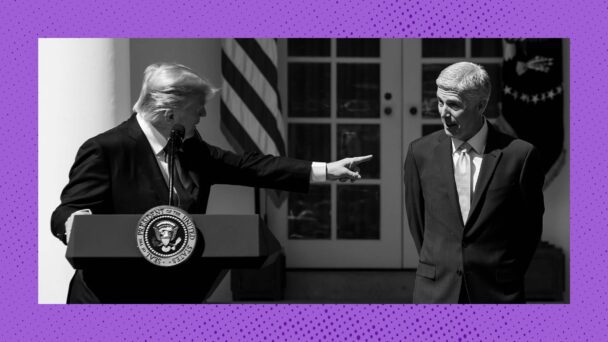Among the more distressing moments during oral argument in Mahmoud v. Taylor, a Supreme Court case challenging a Maryland school district’s use of children’s books with LGBTQ characters, came when Justice Neil Gorsuch started asking questions about bondage. Gorsuch wanted to drill down on the particulars of Pride Puppy, a rhyming alphabet book about a family searching for their lost dog at a pride parade. (Don’t worry, they find the little rascal by the letter V.)

Gorsuch, however, had other subjects on his mind. “That’s the one where [students] are supposed to look for the leather and things—and bondage? Things like that, right?” he asked the district’s lawyer, Alan Schoenfeld. “A sex worker? Sex worker, right?”
After Schoenfeld responded that, no, this picture book for prekindergartners does not include depictions of bondage or sex workers, Gorsuch sounded genuinely surprised and more than a little incredulous. “No? I thought—gosh,” he told Schoenfeld. “I read it!”
Here is the exchange in full, which you can also listen to here:

After oral argument, Republican lawmakers, conservative media outlets, and right-wing activist groups held up this exchange as more damning evidence of the prevalence of insidious pro-gay propaganda in America’s godless schools. Other voices in the conservative media ecosystem had been preparing for this moment for months: During a podcast in January, former Trump Justice Department flack Sarah Isgur explained that she would not want her child reading Pride Puppy, not “necessarily” because of its LGBTQ content, she said, but because of the “really graphic sex stuff.” Isgur went on to cite “L is for leather” and “C is for clamps” as examples of the “way overly sexual content” she would not tolerate in her home.
To help you wade through this fetid stew of conservative hysteria, let me tell you some facts about Pride Puppy, written by Robin Stevenson and illustrated by Julie McLaughlin. In the story, C is for “car, our old Chevrolet” (as the family heads out for the day). L is for “leash” (the puppy is on one) and for “loose” (but someone dropped it!) and for “leaping” (hey, look at that dog go!). At the end of the book, Stevenson includes a list of some 300 additional words, giving children the option to go back to the corresponding page and look for other things that begin with that same letter. One of the L words is “leather,” which, as Schoenfeld noted, takes the form of—please go ahead and clutch your pearls now—a jacket.

As Justice Amy Coney Barrett helpfully noted, “[drag] queen” and “[drag] king” are also on the list. Here are the relevant images in the book:

“Bondage” and “sex worker,” though, are not on the list, despite Gorsuch’s protestations to the contrary. Neither is, uh, “clamps.”

On Bluesky, a baffled Stevenson theorized that Gorsuch did not actually read the book, or, in the alternative, harbors some profoundly misguided ideas about the information women intend to convey by wearing leather jackets in public. McLaughlin similarly pointed to the leather-and-bondage moment as evidence that Gorusch is either a “terrible reader” or simply lying about having read a 30-page children’s story. “I thought telling the whole truth and nothing but truth was kind of the whole deal in court?” she wrote. “Especially the literal highest one in America? No??”
I wanted to try and figure out how Gorsuch—who, again, claimed to have read Pride Puppy in its entirety—could have possibly reached the erroneous conclusion that it introduces children to the worlds of BDSM and sex work. So, I searched the record in Mahmoud v. Taylor for any references to leather, bondage, drag, or sex workers. For reasons that will become apparent, I also searched for “Marsha P. Johnson.”
To my immense relief, no one in this case—not the parents challenging the books, not the district defending them, not the dozens of amici who submitted briefs in the Fourth Circuit or the Supreme Court—asserts that Pride Puppy explicitly discusses “bondage.” (And, to be clear, it does not.) The record in Taylor contains only two passing references to bondage-adjacent subjects: First, the petitioners’ brief mentions a news story about teachers in New York who read a book set at a pride parade (not Pride Puppy) that depicts “leather BDSM attire.” Second, in their complaint and their motion for a preliminary injunction, the petitioners argued that Pride Puppy inaccurately frames pride parades as a “laudable family experience,” and support this assertion with a Washington Post op-ed in which the author describes seeing a “bare-chested man in dark sunglasses whose black suspenders clipped into a leather thong” at a pride parade. Astute readers will note that neither passage has anything to do with the content of Pride Puppy, which is the book Gorsuch ostensibly read, and what this case is about.
On the other hand, the briefs filed by the parents and their amici are absolutely riddled with references to “leather,” along with “lip ring” and “underwear,” as examples of the supposedly salacious bonus items to which unsuspecting Pride Puppy readers may be exposed. I am sure you will be unsurprised to learn that none of these briefs acknowledge that the “leather” is, again, an expensive piece of outwear, or that the “underwear” is worn Superman-style by a person with tights underneath.

So, how did Gorsuch so confidently slide from “leather” to “bondage” at oral argument? It sure seems like a good old-fashioned case of lazy, homophobic stereotyping: In his mind, if gay people are around leather, surely it must come in the form of whips, cuffs, and harnesses. Of course, Gorsuch could have easily disabused himself of this notion by spending somewhere between 30 and 45 seconds flipping through the book over breakfast on Tuesday. But none of the dozens of his conservative activist friends who weighed in on the case said anything to dissuade him of this assumption, and he and his clerks saw no reason to check their work.
The phrase “sex worker” is also nowhere to be found in Pride Puppy, and none of the parties assert otherwise in the record. Gorsuch’s question for Schoenfeld about “sex workers” likely traces back to the parents’ complaint, which notes that the list of bonus terms includes “Marsha P. Johnson,” whom they describe as an “LGBTQ activist and sex worker.” (In district court, the parents further characterized Johnson as “celebrated”; at the Supreme Court, they called her “controversial” instead, perhaps hoping to make the subject matter sound scarier.) Many of the amici supporting the parents seize on this detail, sometimes referring to Johnson by name and sometimes only as a “sex worker,” as load-bearing evidence of Pride Puppy’s impropriety.

Johnson’s name indeed appears at the end of the book under the letter M, along with such lurid, titillating terms as “muffin,” “mouse,” and “magnifying glass.” But if you return to the M page to search for Johnson, an LGBTQ rights advocate and fixture of New York City’s gay community who died in 1992, here is what you find. I want to stress that what follows is what Neil Gorsuch, a man who is 57 years old, proclaimed at Supreme Court oral argument to be an inappropriate visual of “sex worker” in a children’s book.

Other than her name and this image, there is no information in Pride Puppy about Johnson. So, in order to get from her cameo on a signboard to “sex worker,” the Pride Puppy reader has to be able to identify a caricature of a person who passed away three decades ago, and know that this person indeed sometimes engaged in sex work. Given that Pride Puppy is a rhyming storybook about a mischievous lost dog written for four-year-olds learning their ABCs, I am not sure skittish parents are in any real danger of having to have a “challenging conversation” here.
It is also worth pointing out that “being a sex worker” is not the reason Marsha P. Johnson appears in the book, or is remembered today. Framing her as a “sex worker” is roughly analogous to describing Jesus Christ as an amateur sommelier: It’s not incorrect, technically, but it’s not close to right, either.
In any event, no adult with a functioning brain would honestly describe this book as depicting “sex workers,” which is why, like Stevenson and McLaughlin, I strongly suspect that Neil Gorsuch did not read it. I have reached out to him via the Supreme Court’s Public Information Office for comment, and will update this story if I hear back.
Gorsuch would hardly be the first Supreme Court justice to get something wrong at oral argument. But he would also not be the first Supreme Court justice to do a little strategic bullshitting from the bench. In recent years, he and the other conservatives have perfected the art of taking liberties with the facts in situations exactly like this one—“religious freedom” cases that allow the justices to write opinions that advance their preferred policy agenda. A school district in a deep-blue state compelling innocent babes to learn the alphabet by reference to “B is for bondage” is another perfect example of the sort of rampant anti-Christian discrimination that Gorusch seeks to stamp out.
Unfortunately for him, it is also a lie. But in his position, details don’t matter, as long as he can get to five votes.




